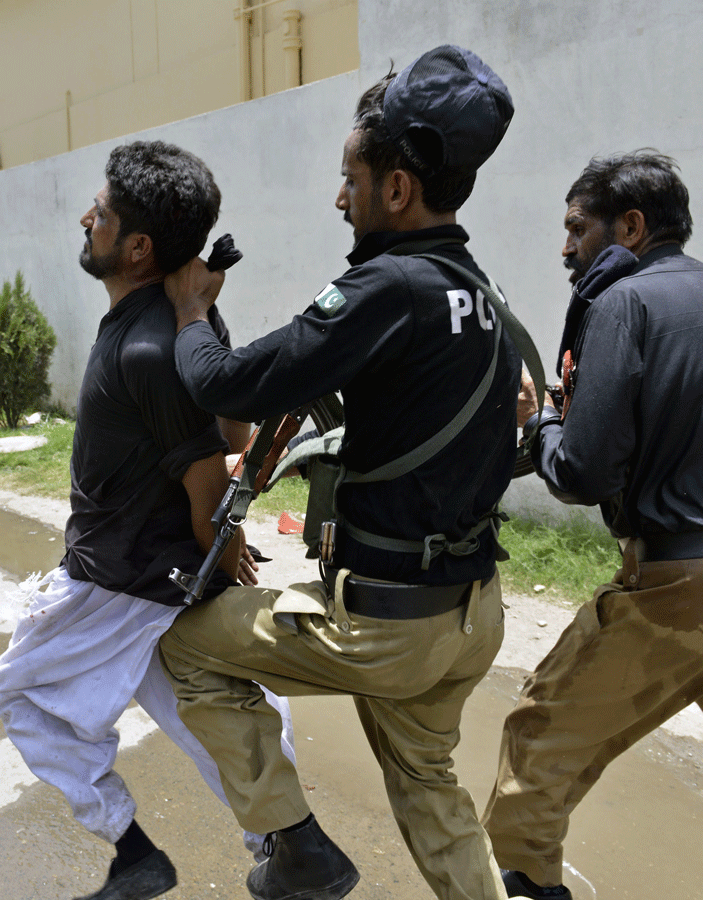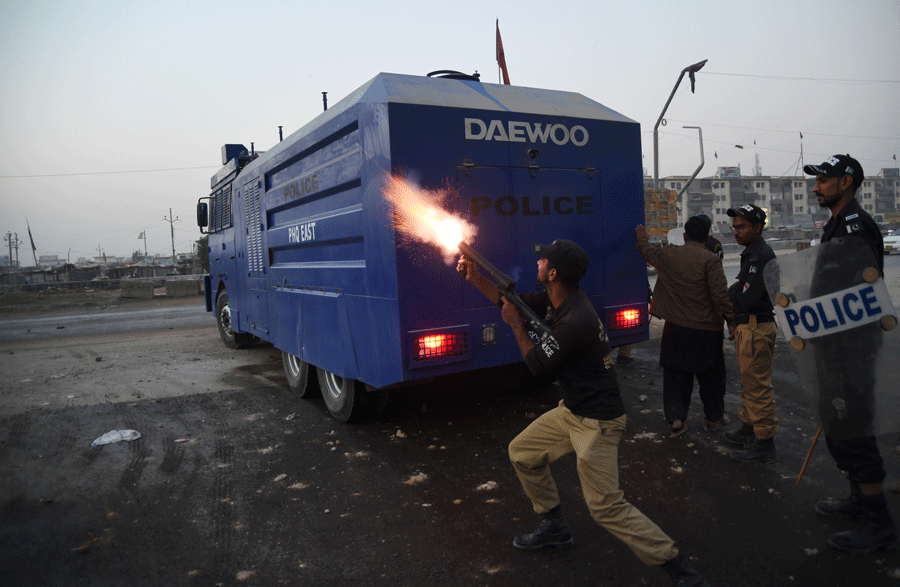Policing the Police
By Zoha Waseem | Cover Story | Published 7 years ago

A recently constituted Police Reforms Committee is the latest initiative taken by the state to reform policing in Pakistan. Over 20 police commissions have been formed in the last 70 years to produce similar recommendations that were subsequently forgotten as being little more than ‘intellectual exercises’. This time, however, due to the Pakistan Tehreek-e-Insaf (PTI) government’s interest in police reforms and the example it has set in Khyber Pakhtunkhwa (KP), as well as the judiciary’s own supervision over police-related matters, there will be increased public and judicial scrutiny on how these reforms are implemented.
In the Police Act case of 2017, the Sindh High Court confirmed the validity of the Sindh Police Act 2011, which repealed the Police Order 2002 and reinstated the 1861 Police Act in the province. In other words, it was decided that policing was a provincial subject following the 18th Constitutional Amendment. The decision came when the Sindh government was attempting to remove former IG Allah Dino Khawaja as chief of police in the province. In April 2018, in another attempt to ensure that the police remained under provincial authority, the Sindh government drafted a bill called the Sindh Police Act 2018. It sought to empower the Home Department to decide on the postings and transfers of senior police officers in the province (the bill has yet to be presented to the Sindh Assembly).
Meanwhile, in Punjab, the senior police bureaucracy had long been advocating for a return to the original Police Order of 2002 (PO 2002). In May 2018, the Chief Justice of Pakistan, Saqib Nisar, took it upon himself to protect Pakistan’s police departments from political interference. At his behest and under the Law and Justice Commission of Pakistan, the Police Reforms Committee (PRC) was formed. Its aim, like the PO 2002, was to propose recommendations for police reforms, after taking into account the judgements of superior courts on police-related issues, including postings, transfers, and other administrative obstacles in police departments. The PRC has been hailed as a milestone and may enable Pakistan to break the curse of wasted opportunities for police reforms.
The PRC’s proposed reforms include internal and external accountability mechanisms, improving the quality of investigations, and revamping urban police departments. The PRC, in line with the ‘criminal justice model’ of counterterrorism, has recommended that the focus of Pakistan’s counterterrorism policies be shifted from kinetic measures to ones that improve the criminal justice system and anti-terror legislation. The PRC considers the PO 2002 as a starting point for a ‘model police law,’ which is to be the standard law across Pakistan.
There are five foreseeable challenges facing the government with respect to police reforms and policing in general. The first concerns the status of the upcoming reforms. As per the Police Act case of 2017 (the most recent judgement dealing with this issue), the provincial government is allowed to make a law in regards to its police departments, which cannot be amended by the federal government. The PRC argues, however, that the 18th Amendment does not exclude the federal government from policing; rather, the amendment calls for inter-provincial coordination and consultation on police-related matters.
The Sindh government is unlikely to accept a change in the traditional belief that policing is a provincial subject and this may result in substantial legal and political debates on the subject, in which the judiciary will ultimately need to intervene further. Given that the National Accountability Bureau (NAB) and the Federal Investigation Agency (FIA) are already being strengthened in order to rein in the PPP, the Sindh government will strive to retain policing and not surrender control to the federal government. No matter the outcome, police reforms will face a legitimacy deficit. Federally-supervised police departments will be criticised for not having locally-representative police officials. Provincially-controlled departments, on the other hand, will be criticised for posting politically-appointed officers.
The second challenge will be the implementation of reforms at the level of police stations. The specific areas that need to be reformed in this aspect include quality of investigations, registrations of FIRs and citizen-police relations. This is where internal accountability and external oversight mechanisms, as proposed by the PRC (similar to the complaints authorities envisioned in the PO 2002), will need to be sufficiently implemented. Cosmetic measures such as the establishment of model police stations are not enough. Junior police officials deserve better salaries, shorter shifts, and the certainty that their superiors will maintain their integrity.
Third, there needs to be a discussion on the militarisation of policing. This is a process that neither guarantees the safety of civilians nor the security of police officials, but serves to delegitimise civilian police officials, who themselves find faults within it. The PRC recommends minimum use of force, but this is difficult to guarantee from police departments that are engaged in countering terrorism, establishing elite units and investing in top-of-the-line security equipment and SWAT-like training techniques.

Fourth, Pakistan has long suffered due to the nexus between VIP culture and the politicisation of police departments. The PTI government has already come under controversy pertaining to this nexus, following the removal of a district police officer, after his encounter with a man linked to the family of the prime minister. This is an unfortunate start to a new era of police reforms in Pakistan, as the new government must ensure that its members refrain from using political leverage to influence the behaviour of law-abiding officers. This nexus poses both personal and professional challenges for the government.
The fifth challenge is the pluralisation of policing, or the coexistence of policing with civilian police departments, paramilitary or military forces, and private entities such as security companies. With multiple agencies and organisations involved in policing civilians in Pakistan, how will the PTI government regulate a fragmented policing landscape? Especially when, in some cases, military and paramilitary bodies tasked with policing and maintaining order are not accountable to civilian governments, at least not in practice. This is a monumental question that raises concerns about the governance of a plural policing landscape that ensures democratic accountability.
The success of these reforms rests on a number of issues, including, but not limited to: aligning civilian (service-oriented) policing with counterterrorism policing and the implementation of the National Internal Security Policy; the impacts of these reforms on street-level policing to ensure the protection of civil liberties and human rights; the extent to which these reforms legitimise local and provincial police departments and whether or not the federal government takes ownership of its civilian police departments.
The PTI government refered to the National Action Plan (NAP) in terms of countering terrorism, even though the NAP has long been criticised for its limited scope and success. Earlier this year, the previous government drafted the National Internal Security Policy (NISP), a far more comprehensive and detailed policy in which aspects of police reforms were included. The NISP stressed that “Policing needs to be improved significantly in Pakistan in terms of performance, accountability and effectiveness for the NISP to be successful,” and made several recommendations for these changes. The government would be well-advised to consider the implementation of the NISP and consult it alongside intended police reforms in Pakistan to ensure long-term stability.
A possible front on which the police resolve will be tested is the streets. If religious extremists, empowered through political gains, take to the streets to force the government to adhere to their idealogical demands, will the police be allowed to use force to stop them with the assurance that the government will support the police during, and after, such an event? Will the police be backed by the paramilitary, or will the latter refuse to act because they were not adequately authorised, leaving civilian police officials to their limited devices? And will the SHOs, under whose jurisdictions such events occur, continue to be used as scapegoats, or will they be guaranteed job security? Police reforms can bring much-needed administrative changes at the top, but on the streets an overpowered, overworked and insecure constabulary may continue struggling.
Last, but not the least, the PTI government must take ownership of all police departments across Pakistan. The federal government has routinely berated Sindh police departments, while crediting the Sindh Rangers for restoring law and order in Karachi. Such rhetoric serves to alienate certain departments, complicating the government’s efforts to address differences between federal and provincial governments, especially when the latter creates roadblocks for implementing police reforms. Regardless of the differences in their performances, civilian police forces must get the same respect as their military counterparts and not be delegitimised by the very governments they serve.
Police reforms can be a step in the right direction, but should these reforms be clipped before they can adequately take root and contribute to the institutional culture of the police, it would be a tragic waste of energy and effort on the part of some of the most well-meaning officers in the police services of Pakistan.
Zoha Waseem is a freelance researcher and editor with a PhD in Police Studies from the School of Security Studies, King’s College London.


